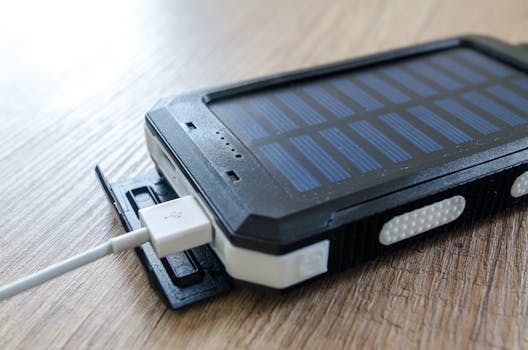
Sustainable Tech: Eco-Friendly Gadgets Shaping 2025
Takeaways: The future of technology is leaning towards sustainability with innovative gadgets that reduce environmental impact. From solar-powered devices to biodegradable materials, 2025 will see a surge in eco-friendly tech that not only enhances our lives but also preserves our planet.
In the coming years, the integration of sustainability into technology will revolutionize our daily lives. As we move towards 2025, the demand for eco-friendly gadgets is rising, driven by consumers who are increasingly aware of their environmental impact. This blog post delves into some of the most exciting sustainable tech innovations that are expected to shape the future.
The Rise of Solar-Powered Gadgets
Solar energy is one of the most abundant and renewable resources available, and it is increasingly being harnessed in the tech industry. By 2025, we will witness a proliferation of solar-powered gadgets that cater to various needs, from personal electronics to home appliances.
Imagine a smartphone that charges itself using solar energy, eliminating the need for traditional chargers and reducing electronic waste. Companies are already experimenting with solar panels integrated into devices, allowing users to harness sunlight to power their gadgets on the go.
Additionally, smart home devices equipped with solar technology will become more commonplace. For instance, outdoor lights that run entirely on solar power, smart irrigation systems that optimize water usage based on weather patterns, and solar-powered air conditioners that reduce electricity consumption will be at the forefront of sustainable living.
Biodegradable Electronics: A Step Towards a Cleaner Planet
The electronics industry has long been criticized for its contribution to e-waste, but innovative companies are now developing biodegradable electronics. These gadgets are made from materials that can decompose naturally, significantly reducing their environmental impact.
By 2025, we can expect to see more products using biodegradable components. For instance, smartphones and laptops with casings made from plant-based plastics or compostable materials will emerge. This shift not only addresses e-waste concerns but also promotes a circular economy where products are designed with their end-of-life in mind.
Moreover, universities and tech firms are collaborating to create sustainable electronic components, ensuring that even the internal circuits and batteries are made from environmentally friendly materials. This advancement will be crucial in fostering a greener tech industry.
Energy-Efficient Devices: The Future of Home Tech
As energy costs continue to rise and climate concerns grow, energy-efficient devices will play a significant role in our households. In 2025, we will see a surge in smart home technologies that optimize energy consumption.
Smart thermostats, energy-efficient appliances, and home automation systems will allow users to monitor and control their energy usage remotely. These gadgets not only save money but also contribute to a reduction in carbon footprints, making them essential for eco-conscious consumers.
Furthermore, advancements in AI and machine learning will enable these devices to learn from user behavior, adjusting settings automatically to maximize efficiency. For example, smart lighting systems that dim or turn off when no one is in the room will become standard in eco-friendly homes.
Wearable Tech for a Sustainable Lifestyle
Wearable technology is evolving beyond fitness tracking and health monitoring. By 2025, we can expect wearables that contribute to sustainability in various ways. From smartwatches made from recycled materials to fitness trackers that encourage eco-friendly habits, the possibilities are endless.
Some companies are already developing wearables that monitor environmental factors, such as air quality and UV exposure, helping users make informed decisions about their health and surroundings. These gadgets not only promote personal well-being but also raise awareness about environmental issues.
Moreover, wearables designed for sustainable fashion, using eco-friendly textiles and production methods, will gain popularity. As consumers become more conscious about their clothing’s environmental impact, tech-integrated apparel will become a staple in sustainable wardrobes.
Conclusion
As we approach 2025, the tech industry is poised to undergo a significant transformation towards sustainability. The eco-friendly gadgets and innovations on the horizon promise to enhance our lives while preserving the planet for future generations. By embracing sustainable technology, we can all contribute to a cleaner, greener future.






